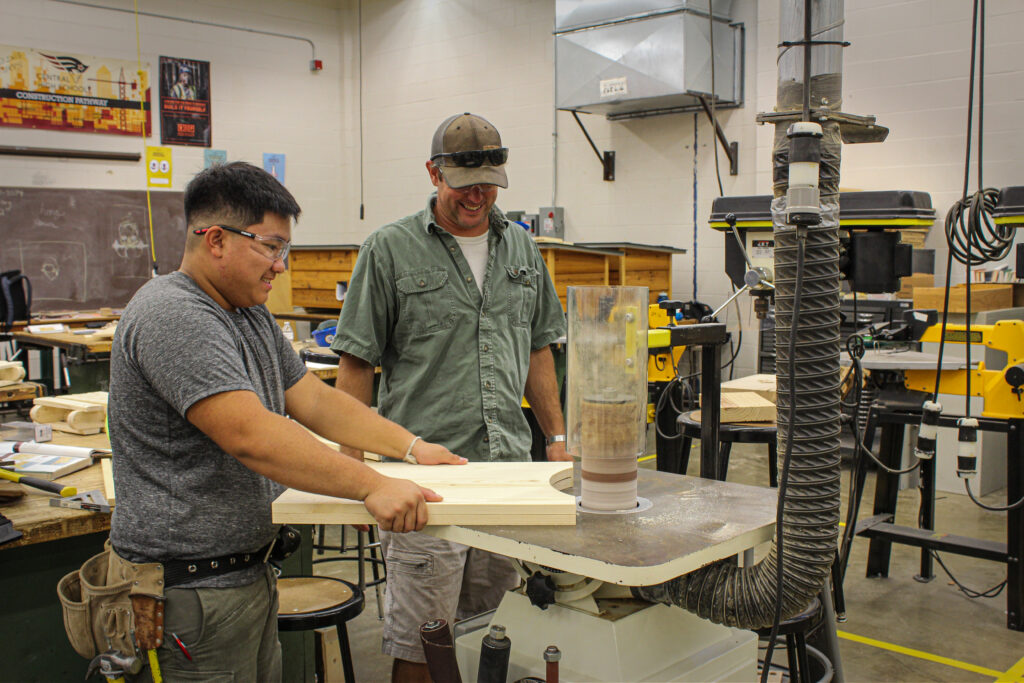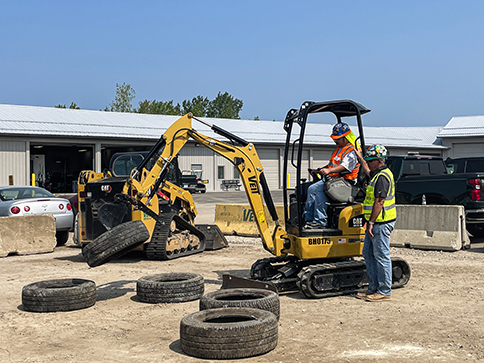Seven Ways for High School Students to Prepare for a Construction Apprenticeship
Here are the top seven ways high school students can set themselves up for success right now to start a career in any of Minnesota’s construction trades after graduation.
There are plenty of great reasons to seek a construction apprenticeship after high school. Between getting paid to learn, doing hands-on work, and getting to create something real to be proud of – a construction apprenticeship offers a number of rewards and benefits that today’s young people are seeking in a career.
If you’re a young person interested in a construction apprenticeship but haven’t yet reached the age requirement to apply (typically 18 years old), it can be hard to know how to prepare yourself for success down the line.
If this sounds like you, don’t fret. Here are seven ways to prepare yourself for a construction apprenticeship starting — right now!
Focus on graduating – In addition to being 18 years old, many construction apprenticeships require that you earn a high school diploma or earn a GED equivalent. Keep your focus on the prize – earn that degree so you can start to work with your hands and make a great living as a plumber, electrician, iron worker, pipe fitter, or any of the other 30 construction careers available.
Start getting experience – While many unions require new apprentices to be 18 years of age or older, there are many job opportunities available to young people right now that allow them to develop a skill set that will support a career in construction in the future. For example, a knowledge of tools such as the experience one gets working at a local hardware store is beneficial to a plumber apprentice candidate.
Other part-time jobs that require being physically fit and outdoors in a variety of conditions include: an outdoor educator or camp counselor, farm laborer, sports team assistant, seasonal yardwork assistant, or even a tech/prop crew member for your high school’s theater department.
The most important part: Show up on time to your part-time summer job, work hard, and obtain a good reference from your employer. Build a reputation as someone who employers can count on.
Construction Internship — High school students who live in the Minneapolis-St. Paul area who want to join the construction trades should consider applying for an internship through the Minnesota Trades Academy (MTA). MTA is a program supported by the Construction Careers Foundation (CCF), a 501(c)3 not-for-profit organization whose mission is to increase the diversity of entrants to the construction trades and foster long-term construction careers.
The program offers hands-on, paid summer construction internship experiences for participants to earn while they learn about construction as a career choice. The goal of the program is to help youth prepare for adulthood through skill development, personal development and the knowledge of how to access good jobs with good benefits in the construction industry.
Take relevant courses in school – In addition to perfecting the hands-on nature of a craft, most construction trades require apprentices to have strong theoretical knowledge as well. This means that sharp math and reading skills will be a huge asset to candidates applying for and entering into a construction apprenticeship. Learning to read plans, ask questions, follow directions, problem solve, and communicate well with other people are essential to a successful career in the construction trades.

A Minnesota Trades Academy instructor guides an intern through a woodshop project at Central High School in Saint Paul, Minnesota.
The recommended prerequisites for high school students include construction courses, shop courses, and math and science courses. Knowledge of chemistry, physics, algebra and geometry are all applied to many construction trades almost every day. Blueprint reading and welding are also useful skills to experience in a shop or mechanics class before starting an apprenticeship.
Obtain a driver’s license – Safety is the No. 1 rule on any job site. And No. 2? It’s showing up on time and being ready to work. That’s why you need a driver’s license and access to a vehicle – to show up on time. Even if your chosen trade doesn’t require the operation of heavy equipment vehicles, most trades still require apprentices to obtain a driver’s license prior to entry into that trade. This will not only support a career in construction by providing mechanical operation skills, but it will give apprentices a means of transportation to and from any given job site.
The first step in obtaining a driver’s license for people under 21 years old is to complete a driver’s education course to learn the rules of the road. To learn how to sign up for a driver’s education course near you, talk to your school’s guidance counselor or visit Driver and Vehicle Services on mn.gov.
Seek mentorship – The Construction Careers Foundation (CCF) provides support services for young adults to help them navigate their application to registered apprenticeship programs and employers. CCF’s trades navigator builds relationships with educators, trades, trades schools and employment partners, to provide the best support to youth for career exploration. The navigator builds a mentoring relationship with youth and works with community resources to help youth find support resources and ongoing transition support.
If you are a student seeking apprenticeship information and guidance contact Trades Navigator Charie Gill at charie.gill@constructioncareers.org.
Do your research – There is a lot that goes into entering a career in any given construction trade. Not to mention, there are more than 30 trades to choose from. Whether you know exactly which trade you want to pursue or want to see what’s all out there, there’s always more to know…and its best to know your stuff.
To explore a trade you are interested in or see what other tracks are available to you, visit the careers page on ConstructionCareers.org. Each trade has its own page that details key skills, recommended high school classes, stories from current apprentices in the trade, and the contact information of local unions.
Construction Careers Foundation: Build Your Future
For more articles similar to this one, visit the blog on ConstructionCareers.org.
To explore more resources for more than 30 Minnesota construction trades, visit the careers page on ConstructionCareers.org.

